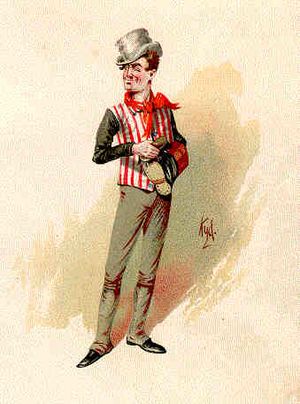Apologetic proverb facts for kids
Wellerisms are a fun and clever way to play with words. They are special sayings that make fun of traditional proverbs. A proverb is a short, well-known saying that gives advice or states a general truth. Wellerisms add a funny twist to these old sayings, often by showing how they might not always be true or by adding a humorous comment. They are also known as apologetic proverbs because they seem to "apologize" for or challenge the original proverb.
Contents
What Are Wellerisms?
A Wellerism usually has two main parts. First, it includes a well-known proverb or a common saying. Second, it adds a humorous explanation or a funny comment. This second part often comes from someone speaking, like a character in a story. The humor often comes from the unexpected twist or from the speaker's silly remark. These sayings often have a bit of dry or sarcastic humor.
Where Did Wellerisms Get Their Name?
The name "Wellerism" comes from a famous book by Charles Dickens called The Pickwick Papers. This book was published in the 1830s. In the story, there is a character named Sam Weller. Sam is known for his funny and clever sayings. He often uses proverbs and then adds his own humorous comments. For example, Sam might say, "Out of the frying pan into the fire, as the man said when he jumped from the frying pan into the fire." Sam Weller's unique way of speaking became so popular that this type of saying was named after him.
Funny Examples of Wellerisms
Here are some examples to help you understand Wellerisms better:
- "Every man for himself," as the elephant said when he danced among the chickens.
* This Wellerism takes the idea of "every man for himself" and makes it funny. It imagines an elephant not caring about the chickens it's stepping on.
- "I'll believe it when I see it," said the blind man.
* This one is humorous because a blind person cannot "see" anything, making the common phrase ironic.
- "It's a wery remarkable circumstance, sir," said Sam Weller, "that poverty should make such a wulgar man of a man."
* This is a classic example from the book, showing Sam Weller's style of adding a personal, often humorous, observation to a general idea.
- "All's well that ends well," said the turkey when it was roasted.
* This Wellerism twists the meaning of the proverb. For the turkey, the end is not "well" at all!
- "Necessity is the mother of invention," as the boy said when he used his socks for a slingshot.
* This example shows a creative, but perhaps silly, solution born out of a need.
Why Are Wellerisms Funny?
Wellerisms are funny because they play with our expectations. We usually expect proverbs to be serious and wise. But Wellerisms take these serious sayings and turn them into something silly or unexpected. They often use:
- Irony: Saying the opposite of what is meant, often in a humorous way.
- Wordplay: Using words in a clever or tricky way.
- Unexpected twists: The ending of the Wellerism is often surprising and makes you laugh.
They show that even wise old sayings can have funny exceptions or be used in silly situations. They make us think about language and humor in a new way.
See also
 In Spanish: Wellerismo para niños
In Spanish: Wellerismo para niños
 | Ernest Everett Just |
 | Mary Jackson |
 | Emmett Chappelle |
 | Marie Maynard Daly |


